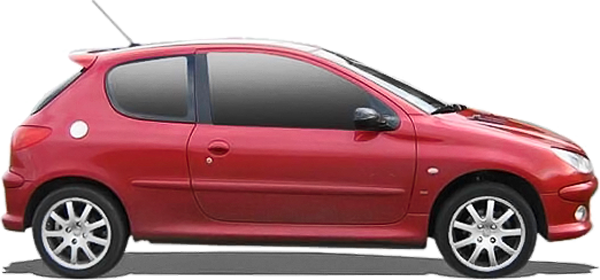The Comparative Analysis :
Peugeot 206 60 (09 - 13) vs. Peugeot 207 5-door 75 (09 - 12)
€ 10,400

€ 13,100

€ 10,400
Base Price ⓘBase price of a new vehicle with standard equipment in Germany at market launch.
€ 13,100
ⓘBase price of a new vehicle with standard equipment in Germany at market launch. Price Info
Vehicle Dimensions
The 206 60 is considerably smaller in every dimension. It's 15.8 cm shorter, 7.9 cm narrower and 2.8 cm lower than the 207 75.
206 60
207 75
1444
1669
1903
1472
1748
1972
1669 mm
Width
1748 mm
1903 mm
Width Incl. Mirrors
1972 mm
1444 mm
Height
1472 mm
2443
3872
2540
4030
3872 mm
Length
4030 mm
2443 mm
Wheelbase
2540 mm
Vehicle Weight
206 60
207 75
1038 kg
Kerb Weight
1214 kg
1361 kg
Gross Vehicle
Weight
Weight
1617 kg

Weight Difference:
176 kg
14.5 %

General
206 60
207 75
2*
Generation
W*
Hatchback
Car Body Style
Hatchback
Unleaded (95 RON)
Fuel Type
Unleaded (95 RON)

Front-wheel drive
Drive
Front-wheel drive

5-speed manual transmission
Transmission
5-speed manual transmission
Engine
206 60
207 75
Straight-four petrol engine (naturally aspirated engine)
Engine Type
Straight-four petrol engine (naturally aspirated engine)
2
Valves
2
4
Cylinders
4
1124 CC
Engine Capacity
1360 CC
59 bhp
at 5500 rpm
Power
72 bhp
at 5200 rpm
206 60
59 bhp
72 bhp
207 75
94 NM
at 3300 rpm
Max. Torque
118 NM
at 3300 rpm
206 60
94 NM
118 NM
207 75
Performance
206 60
207 75
99 mph
Maximum Speed
104 mph
15.2 sec
Acceleration 0 to 62 mph
14.4 sec
62 mph
62
mph
mph
211 m
0.000 sec

206 60
62 mph
62
mph
mph
200 m
0.000 sec

207 75
▶ REPLAY
17.59 kg/bhp
Weight-to-Power Ratio
16.86 kg/bhp
206 60
17.59 kg/bhp
16.86 kg/bhp
207 75
Fuel Economy / Emissions
206 60
207 75
Fuel Economy
49 mpg
combined
45 mpg
206 60
49 mpg
45 mpg
207 75
36 mpg
city
33 mpg
61 mpg
motorway
58 mpg
50 L
Fuel Tank Capacity
50 L
536 mi
Range
493 mi
206 60
536 mi
493 mi
207 75
Environmental Impact
109.9 kWh
Total Energy Consumption
per 100 miles ⓘThe total energy consumption per 100 miles is the amount of energy consumed by a vehicle when burning fuel or using electricity per 100 miles (final energy), and the energy required to produce the appropriate amount of fuel or electricity (primary energy).
per 100 miles ⓘThe total energy consumption per 100 miles is the amount of energy consumed by a vehicle when burning fuel or using electricity per 100 miles (final energy), and the energy required to produce the appropriate amount of fuel or electricity (primary energy).
119.4 kWh
206 60
109.9 kWh
119.4 kWh
207 75
Euro 5
Emission Standard
Euro 5
133 g/km (NEFZ)
CO2 Emissions
145 g/km (NEFZ)
Practical Convenience
206 60
207 75
3
Doors
5
5
No. of Seats
5
323 kg
Maximum Payload
403 kg
285 L
Boot Capacity
270 L






1130 L
Boot Capacity (Seats Down)
923 L















